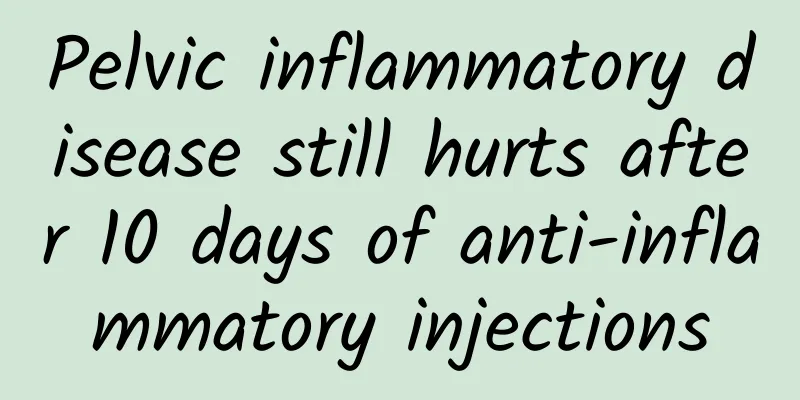Pelvic inflammatory disease still hurts after 10 days of anti-inflammatory injections

|
If you still have pain after 10 days of pelvic inflammatory disease injections, it may be due to factors such as chronic inflammation, improper medication selection, or improper daily care. Let's take a look at these possible causes and how to better deal with them. 1. Chronic pelvic inflammatory disease: This problem is like a stubborn "little devil" and may require longer treatment. Usually, the treatment of chronic pelvic inflammatory disease requires the use of combined antibiotics, such as cephalosporins, penicillins, etc. These drugs must be used in sufficient quantities and for a sufficient course of treatment to effectively relieve pain. It's like when we clean a room, we have to clean it thoroughly so that no dust is left. 2. Improper drug selection: Sometimes, choosing the wrong drug is like using the wrong key and failing to open the "lock" of pain. For pelvic inflammatory disease, fluoroquinolones may not be suitable. During treatment, doctors will choose more appropriate antibiotics based on the patient's specific situation to improve the treatment effect. It's like choosing the right tool, which makes repairs more efficient. 3. The importance of daily care: Daily care during treatment is like "refueling" the body. If you do not pay attention to the frequency of sexual life, local hygiene and diet structure, it may affect the treatment effect. Maintaining good personal hygiene and paying attention to a healthy diet are all part of the treatment. Just like when we grow flowers, watering is not enough, we also need to pay attention to sunlight and soil. 4. Influence of psychological factors: Sometimes, psychological stress can also affect physical recovery. Anxiety and tension may make the pain more obvious. Proper relaxation and a positive attitude can help relieve pain. You can try some relaxation techniques, such as deep breathing and meditation, to help relieve stress. 5. Regular follow-up: During the treatment of pelvic inflammatory disease, regular follow-up is like a "physical examination" for your health. Through follow-up, the doctor can adjust the treatment plan in time to ensure the effectiveness of the treatment. If the symptoms persist, you must seek medical attention in time to avoid worsening of the condition. 6. Adjustment of lifestyle: A healthy lifestyle is the cornerstone of physical recovery. Quitting smoking and drinking, maintaining a regular work and rest schedule, and exercising appropriately can all help the body better fight against diseases. It is like "charging" the body, giving it more power to fight inflammation. Through the above adjustments and attention, I believe that the pain of pelvic inflammatory disease will be improved. Adhere to scientific treatment and good living habits, and your body will gradually recover. Remember to communicate with your doctor regularly to ensure the maximum effect of treatment. I hope these suggestions can help you get rid of the pain as soon as possible. |
<<: What is the reason for less and darker menstruation?
>>: I had my period on the 6th last month. When is the normal date for my period this month?
Recommend
After six months of treatment for chronic pelvic inflammatory disease, there is still a small amount of fluid accumulation.
After six months of treatment for chronic pelvic ...
Will regular exercise cure cervical erosion? These methods are effective in treating cervical erosion
Patients with cervical erosion need to go to the ...
Imported "fine" beef! Ministry of Health: It will be put into operation within one month at the earliest
The Executive Yuan announced a policy direction o...
What causes ectopic pregnancy in women?
Don't think that ectopic pregnancy is far awa...
What to eat during menstruation to detoxify? Eat some whole grains
The menstrual period for women is a process of de...
Which one has higher calories, the southern or northern zongzi? "This landmine" is easy to ignore! Nutritionist Huang Weijie: 3 tips for eating zongzi without gaining weight
The index finger is as big as a "zongzi"...
How to regulate irregular menstruation
How to regulate irregular menstruation? If the me...
What to eat after miscarriage? Eat more of these foods
Many people have miscarriages due to some reasons...
Improper use of the inversion machine may cause blindness. Doctor: Do not exceed 15 minutes
Modern people live under great pressure, have bad...
What should patients with adnexitis pay attention to in their daily lives?
What should patients with adnexitis pay attention...
The National Laboratory has announced that it can detect 7 beta-receptors
There have been waves of scandals surrounding cle...
Are the symptoms of vaginal candidiasis serious?
Some women may experience only mild symptoms, whi...
What harm will vulvar leukoplakia bring to female friends
Some patients do not take it seriously after lear...
Which is more serious, pelvic inflammatory disease or adnexitis?
Which is more serious, pelvic inflammatory diseas...
Study on the slimming boiled egg breakfast: nutritious and fat-reducing
[Key points]: A day's plan begins in the morn...









